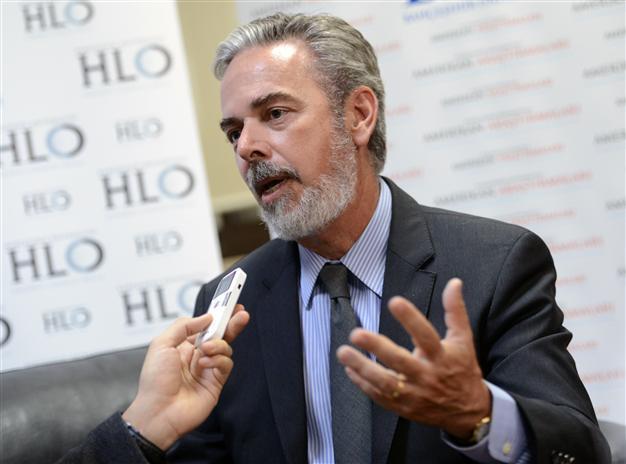Brazil hopeful of Iran deal
ISTANBUL - Hürriyet Daily News

Brazilians FM Patriota (R) talks to Daily News reporter Erdem Güneş. Talks over
Iran’s nuclear program could possibly be revived in the near future, says FM. DAILY NEWS photo, Emrah GÜREL
It may again be possible to revive talks over Iran’s nuclear program, according to Brazilian Foreign Minister Antonio de Aguiar Patriota, who thinks that the May 2010 deal was a missed opportunity.
“The attempt [in 2010], I think, was one of genuine good faith to adopt a confidence-building measure that would represent a step forward in dealing with a very challenging issue. What we’ve seen since May 2010 is that other strategies have not produced better results, namely the unilateral sanctions or the other threats that have been directed against Iran,” Patriota said yesterday in an interview with the Hürriyet Daily News in Istanbul.
Iran had signed an agreement to send uranium abroad for enrichment after talks in Tehran with Turkish and Brazilian leaders in 2010. Tehran agreed to ship 1,200 kilograms of low-enriched uranium to Turkey in return for nuclear fuel rods for a medical research reactor. World powers rejected the deal because Iran had increased its uranium stockpile.
Patriota said he had been hearing many voices saying that new talks with Iran might be possible to bring diplomacy back to the scene in 2013. “In fact, one of the voices who hold this view is that of Carl Bildt, the Swedish Foreign Minister who will be joining me and [Turkish Foreign] Minister Davutoğlu in İzmir for a meeting the next day,” he said.
The foreign ministers of three countries - Davutoğlu, Bildt and Patriota – are all set to attend the annual gathering of Turkish ambassadors today in İzmir to discuss a joint initiative to “prevent assaults against sacred values.”
Patriota’s comments came after Iran’s top nuclear negotiator, Saeed Jalili, said Iran hoped talks with six major powers [the United States, Russia, France, Britain, Germany and China] about its nuclear program would begin very soon, according to Reuters.
“We gave our proposal to Russia and they expressed their readiness for a restart of the talks. We welcome them,” Iranian National Security Council secretary Saeed Jalili was quoted as saying after a speech in New Delhi. “The venue and the time have not been finalized but we hope that these talks will start very soon.”
Patriota also said the U.N. Security Council was in need of reform over how to deal with the Iran nuclear crisis, as the “world is undergoing a very rapid geopolitical change in the nature and distribution of economic and political power.”
“Institutions have to respond to these changes and what we see, for example in the economic and financial area, is that the G-20 already reflects this new state of affairs. The ‘brics’ are all present in the G-20. Turkey is present, South Korea, Saudi Arabia, Argentina and others,” he said, putting the blame on the U.N. format that “was established by and large after World War Two in 1945.”
Patriota suggested a new form of Security Council with two categories.
“For adopting the majority opinion, you should expand the council in two categories: permanent and non-permanent. As you expand the permanent member category I think it would be very important to look at countries that have strong economies, that represent a capacity to influence over outcomes in world affairs, and who are willing to pick up the responsibilities of participating in a Security Council that is more reflective of today’s distribution of power,” he said.
Patriota also answered a question regarding rumors that Syrian President Bashar al-Assad was seeking asylum from Brazil, saying that they had not been contacted by any official from Syria on the issue.
“We continue to support very strongly the efforts of [U.N. and Arab League envoy to Syria] Lakhdar Brahimi,” he said, adding that he thought enough blood had been shed in Syria and enough death, violence and destruction had been seen.
